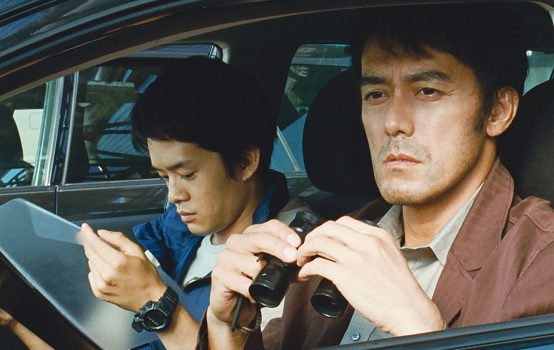The Long Years After Failure

After the Storm, the latest film from writer-director Hirokazu Koreeda (Maborosi, Nobody Knows), opens with a discussion of the 1972 Winter Olympics in Sapporo, where U.S. figure skater Janet Lynn fell during her free skate, came up smiling, and won the hearts of the Japanese audience.
Forty-five years later the reaction of elderly Yoshiko (Kirin Kiki), the mother of Storm’s central character, is very different. “She fell on her butt and got a perfect score,” Kiki grouses. “It doesn’t make sense!”
After the Storm is about a hard passage in middle-aged life: the long years after failure, when your career and your marriage have not worked out, when any fair judge would bury you in the standings and you are not coming up smiling. Yoshiko’s son, Ryota (Hiroshi Abe), is an unshaven, hangdog scuzzball, a corrupt private eye. But he used to be so promising! (That’s where the trouble always begins…) In his youth Ryota won an award for his first novel. Now he uses his detective skills to lurk around behind his ex-wife Kyoko (Yoko Maki) and extort money to fuel his gambling habit. His own mother compares him to a tangerine tree that doesn’t bear fruit. He is scrambling, but he’s not getting any purchase on the ice.
The movie surrounds Ryota with reminders of what might become of him if he doesn’t pull himself together. A neighbor of his grandmother notes, “An elderly man died all alone. … No one knew for three weeks!” A loudspeaker asks people to look for “a lean, elderly man” who has gone missing. He sorts through his late father’s effects (and steals his lottery tickets), as everybody tells him how similar he is to his old man, for good and mostly for ill.
Storm is slow. People who like it more than I did call it “meditative.” It is full of well-observed incident. Ryota doesn’t fit in, both figuratively and literally. He’s so tall that he has to duck through doorways, and he crams himself into his mother’s tiny bathtub, splashing water over the rim. His sister, by contrast, has adapted so well to her world that when her mother swings the freezer door open above her head, she ducks with the grace of decades-long habit.
Koreeda uses tiny gestures like these to show us Ryota’s shifting family relationships: Ryota complains about his mother’s homemade ice cream, but later on, she makes another rock-hard batch. Ryota’s son insists on carrying a present his father bought him, instead of letting Ryota’s ex-wife take it. Both of these gestures speak volumes about the characters, but because these small moments are the film’s high drama, the two hours crawl by—meditatively, I guess—as soft, generic music tinkles.
The storm in the title is a typhoon. It traps Kyoko, Ryota, and their child in Yoshiko’s apartment. As the storm roars, the gestures go from subtle to much too bold. Reconciliations are clumsily attempted and swiftly thwarted.
The relationships between Ryota and his ex-wife, and between Ryota and his son, should be the movie’s heart. Part of the reason it feels strangely trivial is that neither the woman nor the boy feels real. Yoshiko the grandmother is perfectly real, a joy to watch; Ryota is not a joy to watch, but that’s how he’s supposed to be, and he too feels painfully real. But the child and ex-wife, whose affections are the movie’s prize and the hinge on which it turns, are defined completely by their role in Ryota’s story. They have symbolic weight—the broken family is reunited outside, in the wind and downpour, in a way that they couldn’t achieve indoors—but they never quite attain humanity.
After the storm there have been some changes, so small as to be almost invisible to the naked eye. This is a film about incremental change: the first ambiguous movement toward accepting one’s defeats. These are characters who haven’t quite admitted, even by the movie’s end, that they need and want to change, and yet they’re slowly changing anyway.
Earlier in the film, one of Ryota’s clients finds out that her husband is cheating. “Do you wish you hadn’t found out?” he asks.
“Not at all,” she answers. “For better or for worse, it’s all part of my life.” And she picks up her bag, clacks out of the restaurant on her high heels, and moves on.
She might not get up smiling like Janet Lynn. But she faces her defeat honestly and gets up swiftly. Like Lynn, she does in a split second what will take Koreeda’s main characters years of further struggle.
Eve Tushnet is the author of Gay and Catholic: Accepting My Sexuality, Finding Community, Living My Faith and Amends: A Novel, and editor of the forthcoming Christ’s Body, Christ’s Wounds: Staying Catholic When You’ve Been Hurt in the Church. She blogs at Patheos.